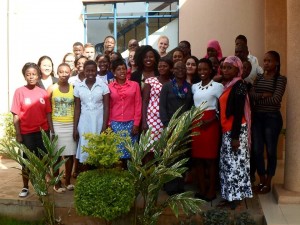International Legal Experience in Your 1L Summer

While some 1Ls spent their summers working in law firms or taking courses abroad, I spent this past summer as an International Legal Partnership (ILP) fellow in Kampala, Uganda working at the Foundation for Human Rights Initiative (FHRI). Doing everything from preparing memos to monitoring death row proceedings, I not only gained amazing legal research experience as an intern within the Research and Advocacy division, but I also fell completely in love with Kampala.
Working Abroad: Contrary to some of the stereotypes associated with student programs that involve going abroad, my time at FHRI was not a vacation. I was not sitting on a beach doing fluff work; I was in an office from 8:30am to 5pm doing actual research and legal work. Within my first week on the job, I was given a two-day deadline to prepare an in-depth memo on life imprisonment procedures and definitions within several countries around the world. This research would be used in recommendations the FHRI would be making regarding a recent movement by the Uganda Law Reform Commission for a revision to the Prison Act.
Another major project that I got to work on was the Research division’s annual thematic report. For 2014, the theme of the report was eradicating poverty in Uganda from a human rights-based approach. Work for this report involved weeks of desktop research which was followed by interviews with government officials, NGOs, and people living in poverty, as well as field visits to local slums and various towns in northern Uganda.
For the first few weeks of the internship, one of the major tasks for interns in the Research division was assisting with the monitoring of police stations. On our visits, we followed an interview questionnaire which included talking with the Officer in Charge to explain our visit – that we were there to help and to simply monitor the human rights situation. After discussing details about the prison such as capacity, forms of disciplinary action, number of staff, challenges faced by officers, septic system, and food access, we were able to walk through the station and select prisoners to interview. Often conducting interviews in a cell with over sixty prisoners, we asked questions such as whether they had been taken to court, the number of meals they had per day, their access to drinking water, their sleeping conditions, any abuse or torture they had experienced at arrest or in prison, and if they had been able to contact their family and friends.
Another research task that I was required to complete was looking into policing and human rights in Uganda in preparation for a forty-five minute presentation that a member of the research team made to the Uganda Police Force at a Uganda Human Rights Commission conference. This research involved looking at the Constitution of Uganda to identify the specific responsibilities of the police and outlining the rights that they are supposed to be upholding.
One of the most intense experiences during my time at the FHRI was monitoring the death row mitigation cases occurring at the Uganda High Court. The mitigation hearings were the result of a landmark judgment from the Supreme Court, Attorney General v. Susan Kigula and 417 Others, where the court ordered that all prisoners whose cases were pending before the appellate courts (this was approximately one-third of the convicts on death row at the time) be remitted back to the High Court to have a sentencing hearing. To prepare for the monitoring sessions, all interns had to review the sentencing guidelines, as well as Article 28 of the Constitution of Uganda, which outline the principles surrounding the right to fair trials. Our role as monitors was to attend the hearings to gauge whether they complied with fair trial principles. This involved assessing the way the lawyers presented their arguments, critiquing their submissions, verifying that the courtrooms were open and accessible to the public, and verifying that the court had an interpreter for convicts speaking other languages given that the proceedings took place in English.
Living in Kampala: This was my first time in not only Uganda, but East Africa in general. Within a few weeks of living in Kampala, I was completely hooked. Forget about the TTC: in order to get around the city I became a pro at using the local motorcycle taxis or“boda-bodas.” A city considered to have one of the best malls in Africa, Kampala is one of the urban capitals in East Africa with not only some of the best nightlife on the continent, but also a booming jazz and art scene that I definitely made sure to take advantage of. From listening to spoken word by local and international artists at late night outdoor open mic sessions at the Uganda National Museum, to scoring gorgeous dresses and skirts with friends in some of the local markets, I definitely worked hard, but also played hard.
Whether I was monitoring a death row mitigation case in the Uganda High Court, bringing up human rights concerns with commanders during prison visits, or meeting with the FHRI’s Executive Director to discuss human rights law, the experience that I gained at the FHRI and the professional networks that I have built made this internship an invaluable investment in my career.
